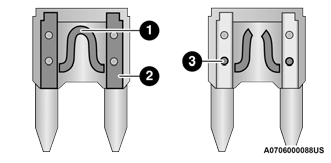Jeep Wrangler 2018-2025 Owners Manual / SERVICING AND MAINTENANCE / VEHICLE MAINTENANCE / Fuses / General Information
Jeep Wrangler: Fuses / General Information
WARNING!
- When replacing a blown fuse, always use an appropriate replacement fuse with the same amp rating as the original fuse. Never replace a fuse with another fuse of higher amp rating. Never replace a blown fuse with metal wires or any other material. Failure to use proper fuses may result in serious personal injury, fire and/or property damage.
- Before replacing a fuse, make sure that the ignition is off and that all the other services are switched off and/or disengaged.
- If the replaced fuse blows again, contact an authorized dealer.
- If a general protection fuse for safety systems (air bag system, braking system), power unit systems (engine system, gearbox system) or steering system blows, contact an authorized dealer.
The fuses protect electrical systems against excessive current.
When a device does not work, you must check the fuse element inside the blade fuse for a break/melt.
Also, please be aware that when using power outlets for extended period of time with the engine off, may result in vehicle battery discharge.

Blade Fuses
- Fuse Element
- Blade Fuse with a good/functional fuse element
- Blade fuse with a bad/not functional fuse element (blown fuse)
 Fuses
Fuses
..
 Power Distribution Center (PDC)
Power Distribution Center (PDC)
The Power Distribution Center is located in the
engine compartment near the battery. This
center contains cartridge fuses, mini fuses, and
relays. The PDC top cover is labeled with each
serviceable fuse/relay location, function, and
size...
Other information:
Jeep Wrangler 2018-2025 Owners Manual: Turn Signal Indicator Lights
When the left or right turn signal is activated, the turn signal indicator will flash independently and the corresponding exterior turn signal lamps will flash. Turn signals can be activated when the multifunction lever is moved down (left) or up (right)...
Jeep Wrangler 2018-2025 Owners Manual: Tire Pressures For High Speed Operation
FCA advocates driving at safe speeds and within posted speed limits. Where speed limits or conditions are such that the vehicle can be driven at high speeds, maintaining correct tire inflation pressure is very important. Increased tire pressure and reduced vehicle loading may be required for high-speed vehicle operation...
Copyright © 2025 www.jewrangler.com

